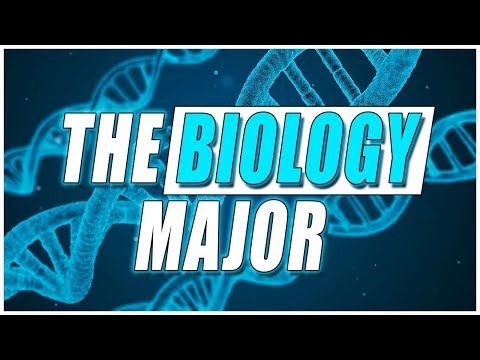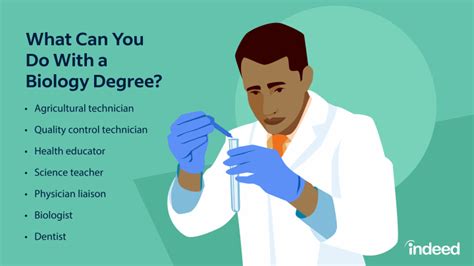Biology Major Careers

The field of biology is an exciting and diverse domain, offering a plethora of career paths and opportunities for those with a passion for understanding life's intricacies. From the study of cells and molecules to the exploration of ecosystems and the environment, a biology major provides a robust foundation for various scientific and research-oriented professions. This article delves into the world of biology-based careers, highlighting the diverse roles, responsibilities, and skill sets required, along with real-world examples and future prospects.
Exploring the Spectrum of Biology Careers

The scope of careers within the realm of biology is vast and varied, reflecting the diverse nature of life itself. Whether you’re fascinated by the microscopic world of cells and genes or the grand scale of ecosystems and biodiversity, a biology degree opens doors to a multitude of rewarding career paths. Here, we delve into some of the most prominent and intriguing career options for biology majors.
1. Research Scientist: Unraveling Biological Mysteries
At the forefront of biological exploration are research scientists. These professionals dedicate their careers to investigating the fundamental processes of life, from the behavior of individual genes to the intricate interactions within ecosystems. Their work often involves designing and conducting experiments, analyzing data, and contributing to the advancement of biological knowledge.
For instance, a research scientist might focus on developing new treatments for genetic disorders, studying the impact of climate change on marine ecosystems, or exploring the potential of plant-based alternatives to fossil fuels. Their findings not only contribute to our understanding of the natural world but also have far-reaching implications for healthcare, environmental conservation, and sustainable development.
| Role | Skills | Real-World Impact |
|---|---|---|
| Geneticist | Genomics, Bioinformatics, Statistical Analysis | Developing personalized medicine, understanding genetic diseases |
| Ecologist | Fieldwork, Data Analysis, Conservation Strategies | Protecting endangered species, mitigating climate change impacts |
| Microbiologist | Microbiology Techniques, Bacterial Identification, Cell Culture | Discovering new antibiotics, studying microbial communities in extreme environments |

2. Healthcare Professionals: Improving Human Health
A biology degree is an excellent foundation for a career in healthcare, where professionals play a crucial role in diagnosing and treating diseases, promoting health, and preventing illness. From physicians and nurses to specialized roles like genetic counselors and laboratory technicians, the healthcare sector offers a wide range of opportunities for biology graduates.
For example, a physician with a biology background might specialize in fields like oncology, where they use their knowledge of cell biology and genetics to diagnose and treat cancer. A genetic counselor, on the other hand, helps individuals and families understand and navigate the implications of genetic disorders, offering support and guidance based on their expertise in human genetics.
| Healthcare Role | Biology Focus |
|---|---|
| Physician | Human Anatomy, Physiology, Pathophysiology |
| Nurse Practitioner | Human Health Assessment, Nursing Care |
| Genetic Counselor | Genetics, Genomics, Genetic Testing |
| Laboratory Technician | Clinical Laboratory Techniques, Microbiology, Chemistry |
3. Environmental Specialists: Guardians of the Planet
For those with a passion for the natural world and a desire to protect and conserve it, a career as an environmental specialist can be incredibly rewarding. These professionals work at the intersection of biology, ecology, and environmental science, focusing on issues such as conservation, sustainability, and the management of natural resources.
Consider the role of a wildlife biologist, who might study the behavior and habitat of endangered species to develop conservation strategies. Or an environmental consultant, who advises businesses and governments on sustainable practices and the potential environmental impacts of their activities.
| Environmental Role | Key Responsibilities |
|---|---|
| Wildlife Biologist | Researching and conserving wildlife, managing habitats |
| Environmental Scientist | Assessing environmental impacts, developing sustainable solutions |
| Conservation Officer | Enforcing environmental laws, educating the public |
| Sustainability Manager | Implementing sustainable practices in organizations |
4. Biotechnology and Pharmaceutical Industries
The biotechnology and pharmaceutical sectors offer exciting career paths for biology majors, particularly those with an interest in the practical applications of biological knowledge. These industries are at the forefront of developing innovative solutions to healthcare challenges, from designing new drugs to creating advanced biological technologies.
A biologist working in biotechnology might focus on developing new treatments for diseases, creating genetically modified organisms for agricultural purposes, or designing biotechnological solutions for environmental issues. In the pharmaceutical industry, professionals with a biology background play crucial roles in drug discovery, development, and testing.
| Biotechnology Role | Key Focus Areas |
|---|---|
| Biotechnologist | Genetic Engineering, Cell Culture, Bioprocessing |
| Pharmaceutical Scientist | Drug Discovery, Clinical Trials, Regulatory Affairs |
| Biological Engineer | Bioprocess Design, Bioinformatics, Synthetic Biology |
| Quality Control Specialist | Ensuring Product Quality and Safety |
Skills and Expertise for Biology Careers

A successful career in biology requires a unique blend of skills and expertise. Here are some key areas of knowledge and abilities that are often sought after in biology-related professions.
1. Scientific Methodology and Critical Thinking
At the core of any biological career is a solid understanding of scientific methodology. This includes the ability to design and conduct experiments, analyze data, interpret results, and draw valid conclusions. Critical thinking skills are essential for evaluating scientific evidence, identifying biases, and proposing innovative solutions to complex problems.
2. Technical Proficiency
Biology professionals often work with a range of specialized equipment and technologies. Whether it’s using microscopes and molecular biology techniques in a laboratory setting or employing advanced software and data analysis tools for research, technical proficiency is crucial. Staying updated with the latest technological advancements in the field is essential for remaining competitive.
3. Communication and Collaboration
Effective communication is key in biology careers, as professionals often need to convey complex scientific concepts to diverse audiences, from fellow researchers to the general public. Collaboration skills are also vital, as many projects involve interdisciplinary teams, requiring biologists to work effectively with professionals from various fields.
4. Adaptability and Continuous Learning
The field of biology is dynamic and ever-evolving. Professionals must be adaptable and open to learning new concepts and methodologies. Continuous professional development, whether through advanced degrees, certifications, or ongoing education, is often necessary to stay abreast of the latest advancements and remain competitive in the job market.
5. Ethical Awareness and Social Responsibility
Biology-related careers often involve ethical considerations, particularly in fields like healthcare and biotechnology. Professionals must be aware of the ethical implications of their work and adhere to high standards of conduct. Additionally, a sense of social responsibility is essential, as many biology careers contribute directly to improving human health, protecting the environment, and advancing sustainable practices.
Conclusion: A World of Opportunities
A biology major opens doors to a diverse array of careers, each with its own unique challenges and rewards. Whether you’re drawn to the world of research, healthcare, environmental conservation, or biotechnology, a solid foundation in biology can pave the way for a fulfilling and impactful professional journey. The skills and expertise gained through a biology degree are not only highly valued in these fields but also provide a solid basis for lifelong learning and continuous professional growth.
What are the typical salary ranges for biology-related careers?
+Salary ranges can vary significantly based on factors such as location, level of education, and years of experience. For instance, research scientists and healthcare professionals often command higher salaries, while entry-level positions in environmental conservation or biotechnology may start at more modest rates. It’s important to research specific job titles and locations to get an accurate idea of salary expectations.
Do I need a graduate degree to pursue a career in biology?
+While a bachelor’s degree in biology can open doors to many entry-level positions, certain careers, particularly in research and academia, often require advanced degrees. For instance, a PhD is typically required for positions as a research scientist or a college professor. However, for many other careers, such as those in healthcare or environmental management, a bachelor’s degree can be sufficient, especially with relevant work experience.
How can I gain practical experience in biology during my studies?
+Practical experience is invaluable for biology students. Consider seeking out internships, research opportunities, or volunteer positions in labs, hospitals, or conservation organizations. Many universities also offer co-op programs that provide structured work experiences alongside your academic studies. These experiences not only enhance your resume but also offer a chance to explore different career paths and make valuable industry connections.
What are some in-demand areas of biology right now?
+Several areas within biology are experiencing significant growth and demand. These include genomics and genetic counseling, environmental science and conservation, and biotechnology and pharmaceutical development. The rapid advancements in these fields, coupled with global challenges such as climate change and the ongoing need for healthcare innovations, are driving demand for biology professionals with specialized skills and knowledge.



